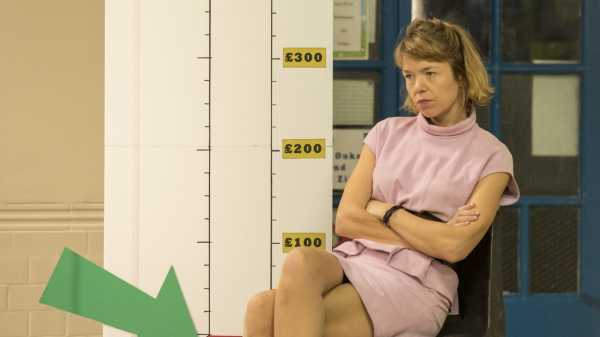
Playing the central mom on “Motherland” (a British sitcom getting its U.S. première on Thursday, on Sundance Now), Anna Maxwell Martin demonstrates a great comedic range of flustered motion. Sometimes the character, an event planner named Julia, herds her two children into her Volvo with a wide-kneed waddle. Sometimes she hustles them through the gates of their London school at a cartoonish skitter. She spends much of the season scrambling for childcare, and all of it scrambling physically. The show, slight but sprightly, proceeds at the pace of her floundering.
“Motherland,” not especially concerned with the actual rearing of children, scarcely casts its eye at scutwork or discipline or the nightly grind of story time. Julia’s kids are not markedly needy, pushy, naughty, obstreperous, or otherwise difficult. They don’t talk back. They barely even talk, and, despite having devoted my frequently cheerful attention to the season’s seven episodes, I couldn’t tell you the name of her five-year-old son. Her nine-year-old, named Ivy, makes a stronger impression: she opens her mouth more often, most notably when, feeling under the weather, she vomits on her bedroom window while her slapdash birthday party awkwardly unfolds in the yard below.
Julia’s current headaches begin when her mother resigns her position as an unpaid babysitter. When her husband, hearing of this departure, suggests that they hire a nanny, Julia balks. “I really want the children to be brought up the way I was—by my mother,” she says to him over the phone, which is their sole means of communication. Husband and wife never appear in the same room, or the same postal code. He’s always away at a work event that resembles a boys’ weekend, or at a stag party that resembles a case study in indolence. From one such idyll, he attempts a pep talk, saying to Julia, “It’s just a case of learning how to juggle everything, and if you drop something I will always be there to pick it up and toss it back to you, so you can just keep on juggling. O.K.?” The line, with its sharp descent from seeming empathy to jaunty callousness, indicates the touch of “Motherland” ’s most prominent creator, Sharon Horgan, whose “Catastrophe” developed snapshots of selfishness in abundance.
You would call Julia manipulative, but the word implies aptitude and cunning, and much of the comedy here extends from the clumsiness of her maneuvering. A typical episode finds her jockeying to earn the approval of a clique of stay-at-home mums, who are familiar from school drop-offs and post-drop-off chitchat over lattes. “Motherland” ’s jokes about competitive parenting are safe and tepid, but they establish the context of Julia’s exertions. She has no ambitions to climb a social ladder, just to avoid sprawling on the treadmill of her daily routine. She wants to accrue capital to exchange for playdates and other favors that might lighten her burden, but her attempts only compound her distress. Meanwhile, her natural allies exist outside the charmed circle. One is Kevin (Paul Ready), a stay-at-home dad distinguished by his panting eagerness to ingratiate himself; his status as an irritant owes partly to the doofiness of the character, partly to the soggy texture of the character type. The other is Liz (Diane Morgan), who the queen bees regard as an inferior, on account of some combination of her accent, her singlehood, and her permissive parenting style. When a child grabs a personal pizza from its baking sheet and proceeds to dig in, she rebukes him, saying, “Excuse me, we are not animals. Use a magazine, please.”
Late in the season, as the series leaps toward a serious-ishness that its heart isn’t quite in, Julia scurries to befriend a dullard whose car pool she wants to exploit, and Liz scolds Julia as a “user.” Thankfully, she does not learn too great a lesson from the reprimand. Her self-seeking behavior is the core of the show, and the agitation that it generates is its own punishment. The season allows its protagonist only one moment of repose. One night, Julia reclines on her sofa, with a dairy treat in hand, turns her chin to the television, and exhales. Then a text message arrives: it’s the car-pool drip summoning her to a pub. Julia, popping up to go pay court, abandons her dessert, which isn’t a pint of ice cream but what looks like a four-ounce cup of yogurt. Her desires are modest, and her opportunities to achieve them even more so.
Sourse: newyorker.com






